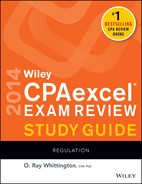Chapter 2: Examination Grading
All State Boards of Accountancy use the AICPA advisory grading service. As your grade is to be determined by this process, it is very important that you understand the AICPA grading process and its implications for your preparation program and for the solution techniques you will use during the examination.
The AICPA has a full-time staff of CPA examination personnel under the supervision of the AICPA Board of Examiners, which has responsibility for the CPA examination.
This chapter contains a description of the AICPA grading process including a determination of the passing standard.
Setting the Passing Standard of the Uniform CPA Examination
As a part of the development of any licensing process, the passing score on the licensing examination must be established. This passing score must be set to distinguish candidates who are qualified to practice from those who are not. After conducting a number of studies of methods to determine passing scores, the Board of Examiners decided to use candidate-centered methods to set passing scores for the computer-based Uniform CPA Examination. In candidate-centered methods, the focus is on looking at actual candidate answers and making judgments about which sets of answers represent the answers of qualified entry-level CPAs. To make these determinations, the AICPA convened panels of CPAs to examine candidate responses and set the passing scores for multiple-choice questions and simulations. The data from these panels provide the basis for the development of question and problem points (relative weightings). As with the previous pencil-and-paper exam, a passing score on the computer-based examination is 75%.
Grading the Examination
All of the responses on the Regulation section of the computer-based CPA examination are objective in nature. Obviously, this includes the responses to the multiple-choice questions. However, it also includes the responses to the requirements of simulations. Requirements of simulations include responses involving check boxes, entries into spreadsheets, form completion, graphical responses, and drag and drop. All of these responses are computer graded. Therefore, no consideration is given to any comments or explanations outside of the structured responses.
Multiple-Choice Grading
Regulation exams contain three multiple-choice testlets of 24 questions each. A few of these questions will be pretest questions that will not be considered in the candidate’s score, but there is no way of identifying those questions. Also, the possible score on a question and on a testlet will vary based on the difficulty of the questions. The makeup of the second testlet provided to a candidate will be determined based upon the candidate’s performance on the first testlet, and the makeup of the third testlet will be determined by the candidate’s performance on the first two testlets. Therefore, you should not be discouraged if you a get a difficult set of questions; it may merely mean that you performed very well on the previous testlet(s). Also, you will receive more raw points for hard and medium questions than for easy questions.
Your answers to the multiple-choice questions are graded by the computer. Your grade is based on the total number of correct answers weighted by their difficulty, and with no penalty for incorrect answers. As mentioned earlier, four of the multiple-choice questions are pretest items that are not included in the candidate’s grade.
Task-Based Simulation Grading
As indicated previously, the responses to the simulations are also computer graded. They will typically involve checking a box, selecting a response from a list, or dragging and dropping an answer.
As with the multiple-choice questions, a small percentage of the simulations will be pretest items that will not be included in the candidate’s grade.
Chapter 3 will provide detailed suggestions on ways that you may use the information about grading to maximize your score.
Requesting a Score Review
For an additional fee, you may request a score review. A score review is a verification of your score making certain that the approved answer key was used. Because the AICPA grades your exam at least twice as a part of its normal process, it is unlikely that you will get an adjustment to your score. You should contact the applicable board of accountancy to request a score review.
